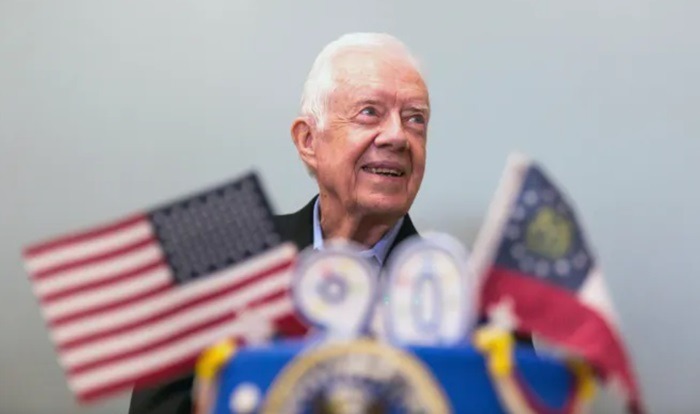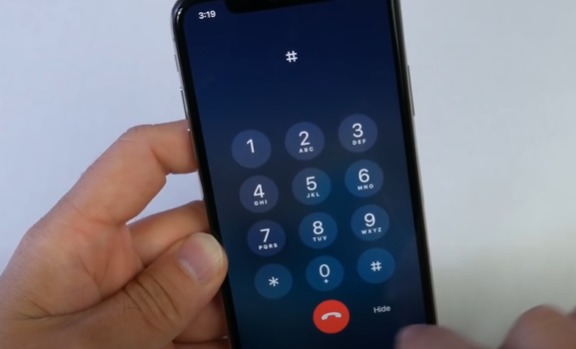Jimmy Carter, the oldest living president of the United States, has died at the age of 100.
Carter, who was president between 1977 and 1981, died on Sunday at his home in Plains, Georgia, according to the Carter Center.
“Our founder, former US President Jimmy Carter, passed away this afternoon in Plains, Georgia,” the organisation, which Carter founded a year after leaving the White House, said in a post on X.
The death was first reported by the Atlanta Journal-Constitution.
No cause of death was immediately given, although Carter had spent almost two years under hospice care at his home after being treated for a form of skin cancer. He celebrated his 100th birthday at his home in October.
Rosalynn Carter, Jimmy Carter’s wife of 76 years, died in November 2023.
Despite serving only one term, the former peanut farmer from Georgia cast a long shadow during his post-presidential career. This included winning the Nobel Prize for Peace in 2002 for The Carter Center’s work in fighting the Guinea worm disease in Africa and tracking elections across the world.
He also continued to volunteer with the Habitat for Humanity home-building organisation late into his life, burnishing a reputation for community service and humility that earned him plaudits from across the political aisle.
In a statement, US President Joe Biden called Carter “an extraordinary leader, statesman and humanitarian”.
“With his compassion and moral clarity, he worked to eradicate disease, forge peace, advance civil rights and human rights, promote free and fair elections, house the homeless, and always advocate for the least among us,” Biden said, adding that he was odering an official state funeral to be held for the former president.
“He saved, lifted, and changed the lives of people all across the globe,” Biden added.
Meanwhile, President-elect Donald Trump wrote on his Truth Social platform that “we all owe [Carter] a debt of gratitude”.
All of the current living former US presidents also weighed in. US President Bill Clinton said Carter “worked tirelessly for a better world”; Former President Barack Obama said Carter “taught all of us what it means to live a life of grace, dignity, justice and service”; and Former President George W Bush said Carter’s life would “inspire Americans for generations”.
French President Emmanuel Macron was among the first world leaders to react to the death, saying Carter “has been a steadfast advocate for the rights of the most vulnerable and has tirelessly fought for peace”.
British Prime Ministrer Keir Starmer added that Carter “redefined the post-presidency with a remarkable commitment to social justice and human rights at home and abroad”.
Tumultuous presidency
Carter entered the 1976 presidential race as a moderate Southern Democrat with little national name recognition. Nevertheless, he saw an unexpected surge amid anger over US involvement in the Vietnam war and the scandal-ridden presidency of Richard Nixon.
But Cold War pressures and economic woes at home burdened his presidency, which was further marred after 52 Americans were taken hostage at the US Embassy in Tehran in 1979. Republican challenger Ronald Reagan went on to handily defeat Carter in the 1980 election.
Still, Carter oversaw some major diplomatic victories while in office, including helping to forge a deal between then-Egyptian President Anwar Sadat and Israeli Prime Minister Menachem Begin, which restored diplomatic and economic ties between the two countries, in 1978. The Camp David Accords were reached on the condition that Israel return the Sinai Peninsula to Egypt.
In a statement on Sunday, Egyptian President Abdel Fattah el-Sisi said Carter’s “significant role in achieving the peace agreement between Egypt and Israel will remain etched in the annals of history, and his humanitarian work exemplifies a lofty standard of love, peace, and brotherhood,”
While the agreement did not solve the Palestinian issue, Carter went on to be an outspoken advocate for Palestinian rights.
In 2006, he published the book Palestine: Peace Not Apartheid, using a label that major rights groups Human Rights Watch and Amnesty International would not adopt for more than a decade. He was also a vocal critic of the pro-Israel lobby in the US.
In a post on X on Sunday, author Assal Rad described Carter as “one of the only US presidents who spoke honestly about Palestine”.
Human Rights Watch said Carter “set a powerful example for world leaders to make human rights a priority, and he continued to fight for human rights after he left office”.

















